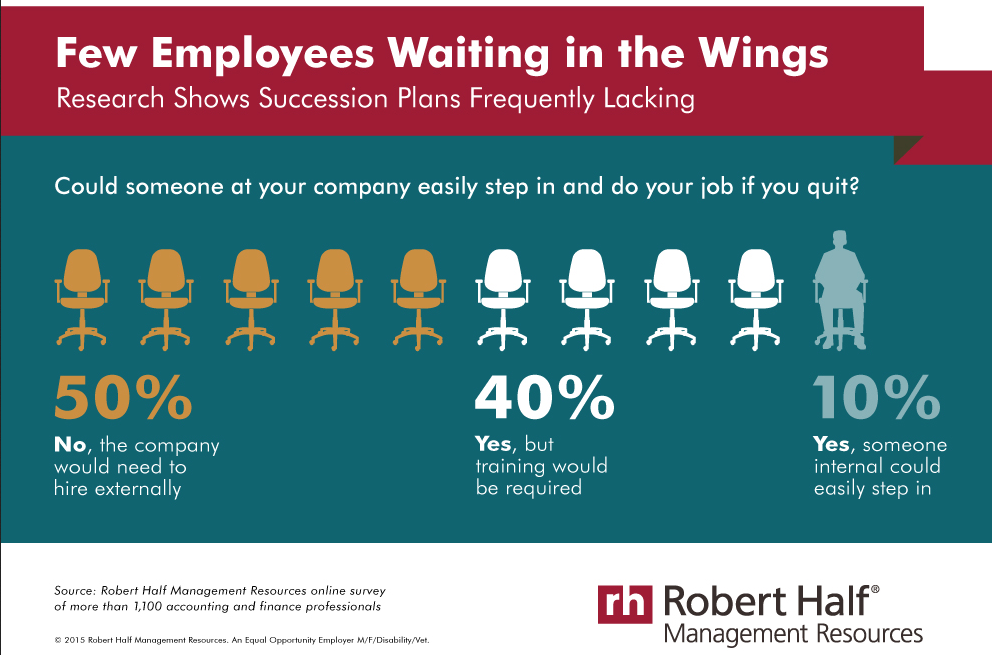Have you ever thanked someone for a job well done by saying, “I don’t know what we’d do without you”? Well, in a well-run public accounting firm, managers do know what they’d do if an employee left the team. They have succession plans in place. Creating contingencies for the replacement of staff members — be they Baby Boomers leaving for retirement or workers heading to another role — is essential to the long-term success of your firm. That’s why it should never be left to chance.
Not Just for the C-suite
The focus of succession planning has traditionally been the top of the organizational chart, as that’s where most of the major business decisions are made. However, the loss of a staff member at any level can have ramifications in terms of productivity, workflow and customer service.
In a recent Robert Half Management Resources survey, only 10 percent of accounting and finance professionals said someone at their organization could easily take over their job if they quit, while 50 percent said the company would need to make a new hire. That finding should give employers pause. When it takes an average of four to five weeks to fill an open accounting position, that’s at least month of being short-staffed. So what steps can you take to ensure stability and continuity in your firm?
A Winning Succession Planning Strategy
The new year is an ideal time to review and update your succession plan. Here are some actions you can take in the next few months:
- Prepare a strategy for every position. Every employee plays a role in the firm’s success, so include all staff members when creating your succession plans. Consider what knowledge and skills you would lose if each person left tomorrow and how you would fill that role.
Be creative in your thinking. For example, instead of merely shuffling around employees, might it be better to divide one job among two or three accountants? Another possibility is to have a worker take on half of the duties and bring in a skilled financial consultant or temporary professional to handle the rest as you search for a full-time replacement. This person-by-person succession planning will take time and thought for you and other managers, but the peace of mind it affords is well worth the effort. When you do lose someone, as inevitably happens, your firm won’t be thrown into a panic.
- Lay the groundwork. Succession planning is not just about what happens after someone leaves. Managers must also have an ongoing commitment to leadership training and other forms of professional development. Once you’ve formulated your plans, consider what coaching and preparation would-be successors need. This strategy nicely complements the career-path conversations you should be having with each team member.
- Recruit for the future. When hiring, take a long-term perspective. Remember, you’re not just filling a position, but also preparing for the firm’s future success. So as you sift through resumes and conduct interviews, look for in-demand leadership traits, in addition to the relevant accounting skills and experience. Taking this approach is helpful when recruiting recent graduates and other entry-level accountants as well. Generation Z employees expect to progress quickly in their jobs and are attracted to employers that demonstrate a commitment to career pathing, according to recent research from Robert Half and Enactus.
- Create opportunities to shine. Sometimes it’s difficult for future leaders to realize their full potential — and for you to recognize it — if they don’t have a chance to show what they are capable of. To find those diamonds in the rough, open up project-based leadership roles to your entire staff. And don’t be afraid to approach promising candidates. For those who are a little shy, a nudge from management may be what they need to build up their confidence, tackle a new challenge and become a polished leader. What’s more, by seeing how employees perform in real-world situations, you’ll have a chance to test the feasibility of your succession planning.
Losing a key person can be a blow to any public accounting firm, but the effects can be mitigated if you anticipate and prepare. So take a fresh look at your succession planning efforts, and make sure you’re ready for whatever challenges the new year holds.
——-
Paul McDonald is senior executive director at international staffing firm Robert Half. He writes and speaks frequently on hiring, workplace and career management topics. Over the course of more than 30 years in the recruiting field, McDonald has advised thousands of company leaders and job seekers on how to hire and get hired.
Thanks for reading CPA Practice Advisor!
Subscribe Already registered? Log In
Need more information? Read the FAQs
Tags: Firm Management





